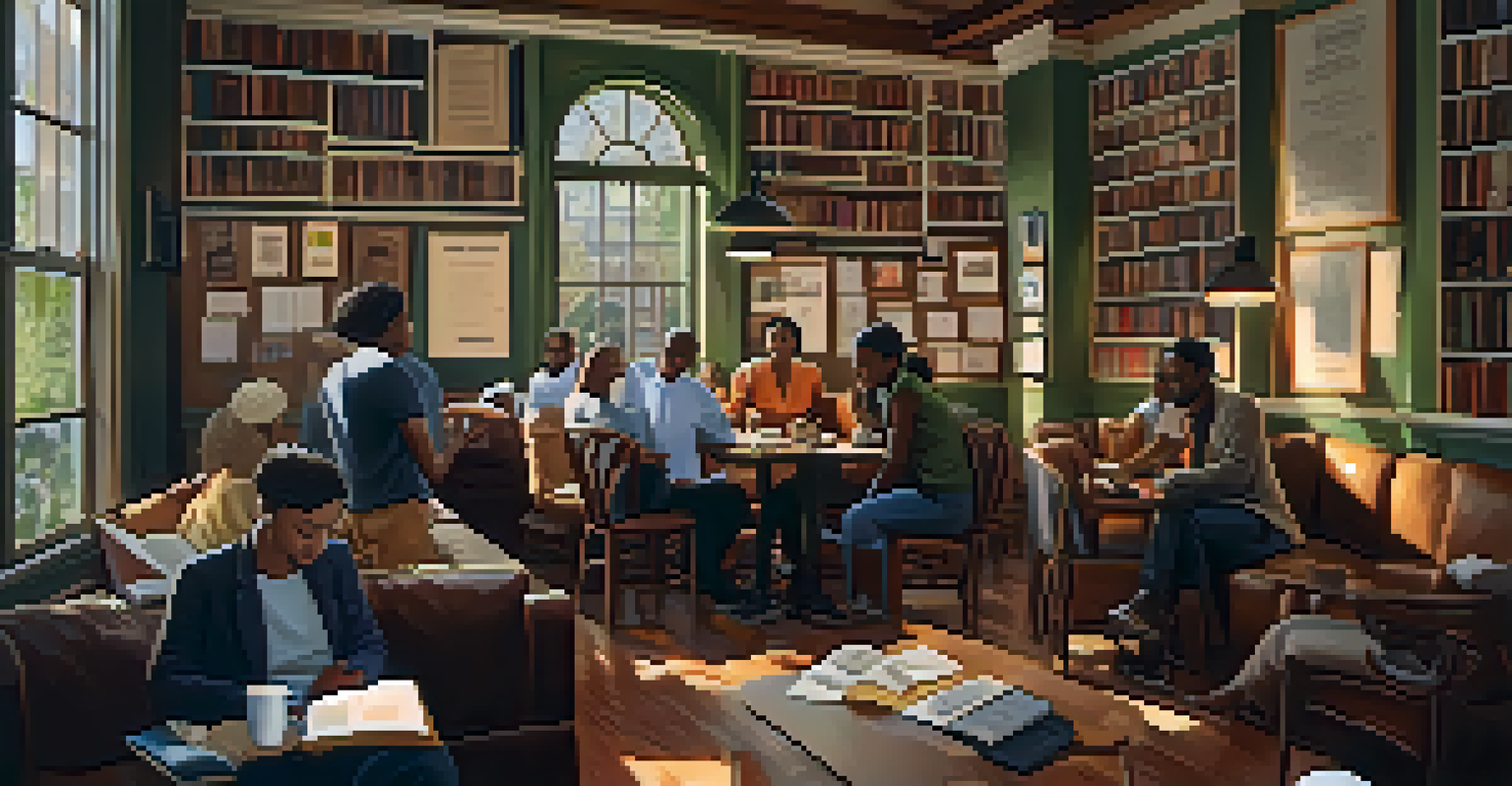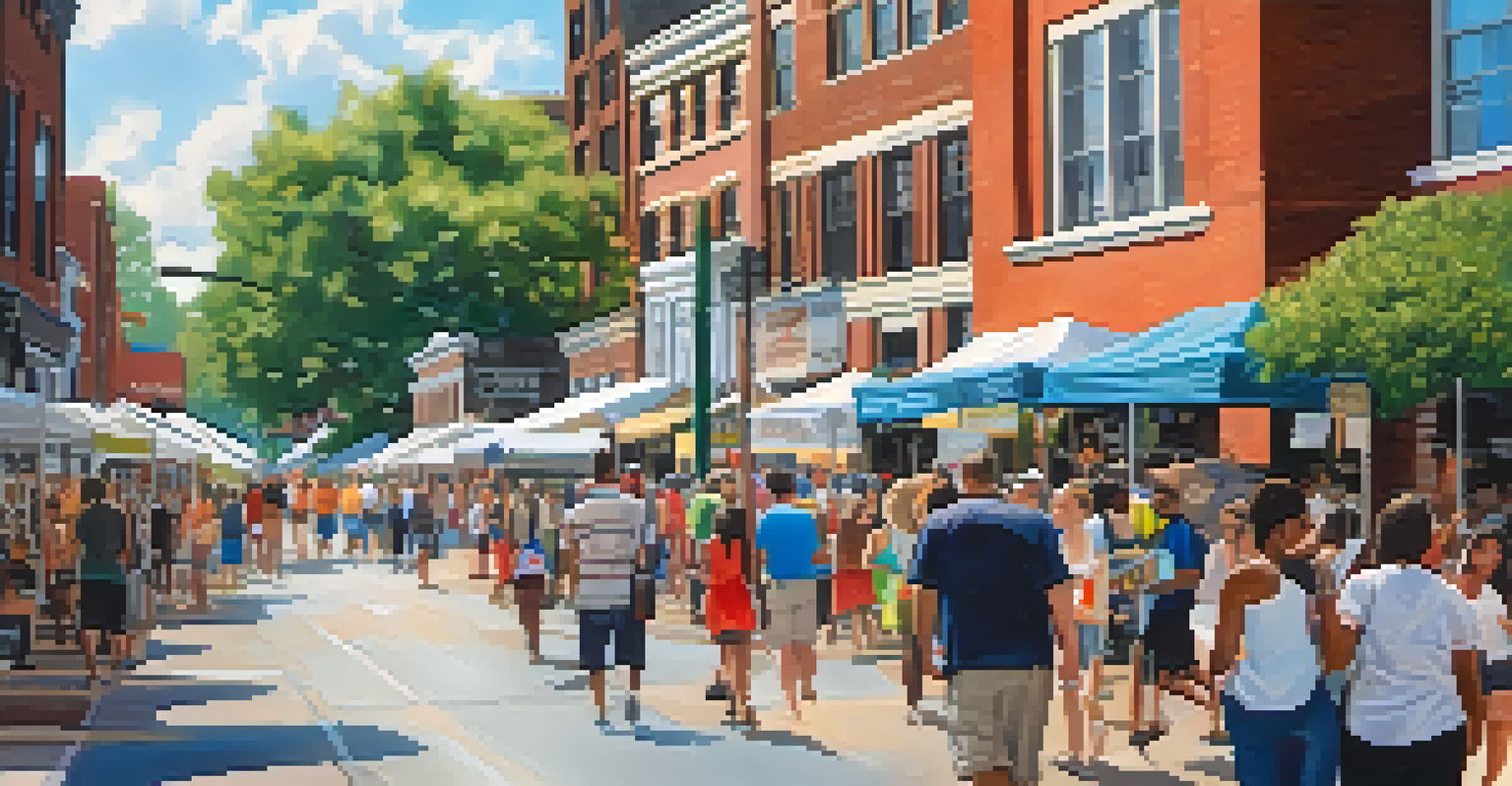Influence of Southern Literature on Atlanta's Identity

Defining Southern Literature and Its Roots
Southern literature encompasses a wide range of literary works that reflect the unique culture, history, and social dynamics of the American South. It often delves into themes like family ties, racial tensions, and the complexities of Southern identity. Writers such as William Faulkner and Flannery O'Connor have become synonymous with this genre, showcasing the South's rich narrative tradition.
Southern literature is more than just a reflection of the South; it captures the essence of its people and their stories.
Atlanta, as a cultural hub of the South, has been significantly influenced by these literary giants. Their works often highlight the struggles and triumphs of life in the region, serving as mirrors to the city’s evolving identity. By examining the social fabric of Atlanta, we can see how these narratives resonate with the city's experiences.
As we explore further, it’s essential to understand that Southern literature is not just about storytelling; it's about capturing the essence of a place and its people. This literary tradition has helped shape Atlanta’s identity, making it a city that honors its past while looking toward the future.
Atlanta's Role as a Literary Epicenter
Atlanta has established itself as a significant literary epicenter in the South. With institutions like the Atlanta Writers Club and events such as the Decatur Book Festival, the city fosters a vibrant literary community. This environment not only nurtures local talent but also attracts writers from across the nation, enriching the Southern literary scene.

The city's literary culture is diverse, reflecting the myriad voices that contribute to its identity. From poets to novelists, the range of genres and styles showcases the complexities of life in Atlanta. This diversity allows for a more nuanced understanding of what it means to be a Southerner, as different perspectives come together to form a rich tapestry.
Atlanta as a Literary Hub
Atlanta serves as a vibrant literary epicenter, fostering local talent and attracting diverse voices that enrich Southern literature.
Moreover, Atlanta's historical significance, particularly during the Civil Rights Movement, has inspired countless literary works. Authors often draw upon this rich history, creating narratives that explore themes of justice, equality, and resilience, further cementing the link between Southern literature and Atlanta's evolving identity.
Themes of Identity and Belonging in Atlanta's Literature
One prominent theme in Southern literature is the exploration of identity and belonging, which resonates deeply in Atlanta’s diverse population. This city, known for its melting pot of cultures, reflects the struggles and triumphs of individuals seeking their place within a larger societal framework. Writers often depict characters grappling with their identities against the backdrop of a changing South.
The South is a place where the past is never dead; it’s not even past.
For instance, novels set in Atlanta frequently highlight the complexities of race, class, and regional pride. These narratives encourage readers to reflect on their own experiences and relationships, fostering a sense of connection and understanding. By addressing these themes, authors contribute to a broader conversation about what it means to belong in a city shaped by its history.
This exploration of identity is not just limited to fiction; it extends to poetry and essays as well. Atlanta's literary voices use their craft to articulate the joys and challenges of life in the South, creating a space for dialogue and reflection. This ongoing conversation is vital for Atlanta as it continues to define its identity in the modern era.
Influence of Local Authors on Atlanta’s Culture
Local authors play a crucial role in shaping Atlanta's cultural landscape. Through their works, they often highlight the city's unique characteristics, such as its vibrant arts scene, rich history, and diverse communities. These writers serve as cultural ambassadors, capturing the spirit of Atlanta and sharing it with the world.
For example, authors like Pearl Cleage and Tayari Jones weave narratives that reflect the complexities of Atlanta life, addressing themes like love, loss, and social justice. Their stories not only entertain but also provoke thought and inspire action within the community. This influence is palpable as their works resonate with readers who may see their own experiences reflected on the page.
Identity and Belonging in Literature
Southern literature explores themes of identity and belonging, reflecting the complexities of Atlanta's diverse population.
Moreover, these local voices contribute to Atlanta's reputation as a city of storytelling. Events such as literary festivals and book readings further showcase the talents of local authors, allowing them to connect with audiences and foster a love for literature. This vibrant literary culture ultimately enriches Atlanta's identity, creating a sense of pride among its residents.
The Legacy of Southern Gothic in Atlanta
Southern Gothic is a subgenre of Southern literature that thrives on exploring the darker aspects of life in the South. This style often involves grotesque characters, decayed settings, and moral challenges, painting a vivid picture of the region's complexities. Atlanta has produced its share of Southern Gothic writers who delve into these themes, creating a lasting impact on the city's literary identity.
Authors like Carson McCullers and Flannery O'Connor have left an indelible mark on Atlanta's literary landscape. Their works often explore themes of isolation, community, and the human condition, inviting readers to confront uncomfortable truths about society. This legacy continues to influence contemporary writers who draw inspiration from the Southern Gothic tradition.
As a result, the Southern Gothic genre contributes to Atlanta's identity by encouraging readers to engage with the city's historical and social complexities. This exploration of the darker aspects of life fosters a deeper understanding of the South’s cultural narrative, reminding us that beauty and darkness often coexist in the stories we tell.
Southern Literature and Social Change in Atlanta
Southern literature has often served as a catalyst for social change, especially in a city like Atlanta, which has been at the forefront of civil rights movements. Many authors use their platforms to address pressing social issues, inspiring readers to reflect on their beliefs and actions. This literary activism plays a vital role in shaping Atlanta's identity as a city that values progress and inclusivity.
For instance, works that tackle racism, inequality, and social justice resonate deeply in a city that has navigated its own historical struggles. Writers often weave these themes into their narratives, encouraging readers to confront uncomfortable truths and advocate for change. This connection between literature and activism underscores the power of storytelling in fostering societal growth.
Literature and Social Change
Southern literature in Atlanta acts as a catalyst for social change, addressing pressing issues like racism and inequality through compelling narratives.
Furthermore, Atlanta's literary community actively engages in discussions around social issues through book clubs, public readings, and community events. These initiatives not only promote local authors but also create spaces for dialogue about pressing concerns. As literature continues to inspire action, it reinforces Atlanta's identity as a city committed to social justice and equality.
The Future of Southern Literature in Atlanta
As we look to the future, Southern literature in Atlanta is poised for continued growth and evolution. The city’s diverse population and rich cultural heritage provide a fertile ground for new voices and perspectives. Emerging authors are increasingly exploring contemporary issues, reflecting the city's changing dynamics and the broader Southern experience.
Moreover, technological advancements and social media have transformed how literature is shared and consumed. Online platforms offer writers new opportunities to reach audiences beyond traditional publishing channels. This democratization of literature allows for a wider range of stories to be told, further enriching Atlanta’s literary landscape.

In conclusion, the influence of Southern literature on Atlanta's identity is profound and ongoing. As the city continues to embrace its literary heritage while welcoming fresh voices, the stories that emerge will undoubtedly shape the cultural narrative for generations to come. Atlanta's identity, rooted in its literary past, remains vibrant and ever-evolving.